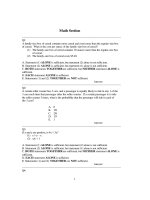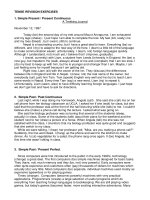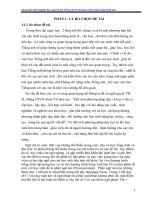Bài tập về thì tiếng anh hay
Bạn đang xem bản rút gọn của tài liệu. Xem và tải ngay bản đầy đủ của tài liệu tại đây (81.56 KB, 5 trang )
I. Put the verbs into the correct tense (Simple Past or Past Continuous).
1. While Tom (read) ____________, Amely (watch) ____________a documentary on TV.
2. Marvin (come) ____________ home, (switch) ____________on the computer and (check)
____________his emails.
3. The thief (sneak) ____________into the house, (steal) ____________the jewels and
(leave) ____________ without a trace.
4. Nobody (listen) ____________while the teacher (explain) ____________the tenses.
5. While we (do) ____________a sight-seeing tour, our friends (lie) ____________on the
beach.
6. He (wake) ____________up and (look) ____________at his watch.
7. The receptionist (welcome) ____________the guests and (ask) ____________them to fill
in the form.
8. The car (break) ____________down and we (have) ____________to walk home.
9. The boys (swim) ____________while the girls (sunbathe) ____________.
10. My father (come) ____________in, (look) ____________around and (tell)
____________me to tidy up my room.
11. As long as one group (prepare) ____________dinner, the others (collect)
____________wood for their campfire.
12. While the parents (have) ____________breakfast, their children (run)
____________about.
13. Martha (turn) ____________off the lights and (go) ____________to bed.
14. We (wait) ____________for Jane, when suddenly Louis (come) ____________around the
corner.
15. I (cycle) ____________through the park, when I (hear) ____________a strange noise.
16. He (pass) ____________her a message when the teacher (look / not) ____________.
17. I (fall) ____________asleep while I (watch) ____________TV last night.
18. When Mike and Jane (paint) ____________the walls, their dog (knock)
____________over the paint pot.
19. Tom (break) ____________his leg when he (play) ____________frisbee.
20. The phone (ring) ____________when I (sit) ____________on the toilet.
21. I (jog) ____________in the park, when two squirrels (cross) ____________my way.
22. Robert (fall) ____________off the ladder when he (pick) ____________cherries.
23. Archimedes (discover) ____________the theory of buoyancy while he (take)
____________a bath.
24. When we (travel) ____________around Ireland, we (meet) ____________some very nice
people.
25. While she (speak) ____________on the phone, the milk (boil) ____________over.
26. When I (leave) ____________the house this morning, the sun (shine) ____________.
27. Caroline (burn) ____________her hand when she (iron) ____________her clothes.
28. Two days ago, a murder (happen) ____________in Market Street at about seven pm.
29. Yesterday, Sherlock Holmes (arrive) ____________at the crime scene to investigate.
30. He (ask) ____________on of the tenants in the house.
31. »What (do / you) ____________yesterday at seven?«
32. »I (watch) ____________a football match on TV.«
33. » (be) ____________you alone?«
34. »Yes, I (be) ____________.«
35. » (hear / you) ____________anything suspicious?«
36. »Yes, about seven o'clock, two people (argue) ____________in the hallway. But the
football match (be) ____________so interesting. So I just (turn) ____________up the telly and then (hear /
not) ____________anything anymore.«
37. A: »What (do / you) ____________yesterday at 8 pm?«
38. B: »I (sit) ____________in the pub with Sam. Why?«
39. A: »I (drive) ____________to the sports centre at that time to play squash with a few
friends. As we only three players, I (try) ____________to ring you to ask if you would like to come as
well. But I (reach / not) ____________you at home.«
40. B: »Why (ring / not / you) ____________my mobile?«
41. A: »I actually (want) ____________to ring your mobile, but by accident I (dial)
____________William's number. He (do / not) ____________anything special at that moment and really
(like) ____________the idea of playing squash with us.«
42. When I (do) ____________the washing-up, I (break) ____________a plate.
43. While Tom (play) ____________the piano, his mother (do) ____________the washing-up.
44. He (drink) ____________some juice and then he (eat) ____________a few chips.
45. I (have) ____________dinner when I suddenly (hear) ____________a loud bang.
46. When my father (work) ____________in the garden, an old friend (pass) ____________by
to see him.
47. She (go) ____________to school, (take) ____________out her textbook and (begin) vto
learn.
48. When it (start) ____________to rain, our dog (want) ____________to come inside.
49. When Jane (do) ____________a language course in Ireland, she (visit)
____________Blarney Castle.
50. When I (be) ____________on my way home, I (see) ____________an accident.
51. I (not / understand) what they (talk) ____________ about.
52. When I (get) ____________up yesterday, the sun (shine) ____________.
53. It (is) ____________a beautiful morning.
54. So I (decide) ____________to cycle around a little.
55. I (go) ____________to the shed and (take) ____________out my bike.
56. While I (cycle) ____________past some villages, I (see) ____________some people in
their gardens.
57. One man (mow) ____________the grass while his wife (pick) ____________strawberries.
58. After one hour of cycling in sunshine, a big fat raincloud suddenly (appear)
____________and it (start) ____________to rain.
59. Luckily, a farmer (notice) ____________me and (tell) ____________me to come in.
60. While it (rain) ____________outside, I (sit) ____________in the farmer's house.
61. After a while, the sun (come) ____________out again.
62. I (thank) ____________the farmer for his hospitality and (move) ____________on.
Form
Simple Past Past Progressive
irregular verbs: see 2nd column of irregular verbs
I spoke
regular verbs: verb + ed
I worked
past form of 'be' + ing form of verb
I was speaking
you were speaking
he / she / it was speaking
we were speaking
they were speaking
Exceptions
Exceptions when adding 'ed' :
when the final letter is e, only add d.
Example: love - loved
after a short, stressed vowel, the final
consonant is doubled
Example: admit - admitted
final l is always doubled in British English
(not in American English)
Example: travel - travelled
after a consonant, final y becomes i. (but:
not after a vowel)
Example: worry - he worried
but: play - he played
Exceptions when adding 'ing' :
silent e is dropped (but: does not apply for
Example: come - coming
but: agree - agreeing
after a short, stressed vowel, the final
consonant is doubled
Example: sit - sitting
final l is always doubled in British English
(not in American English)
Example: travel - travelling
final ie becomes y.
Example: lie - lying
Use
After another or at the same time?
Do you want to express that the actions in the past happened one after another or at the same time?
Simple Past Past Progressive
after another
She came home, switched on the computer and checked
her e-mails.
at the same time
Simon was playing on the computer while his brother was
watchin TV.
New action or already in progress?
If you want to express that a new action happened in the middle of another action, you need both tenses:
Simple Past the new action and Past Progressive for the action already in progress.
Simple Past Past Progressive
new action
My mobile rang (when I was sitting in a meeting.)
action already in progress
While I was sitting in a meeting, (my mobile suddenly rang.)
Only mentioning or emphasising progress?
Do you just want to mention that an action took place in the past (also used for short actions)? Or do you
want to put emphasis on the progress, e.g. that an action was taking place at a certain time?
Simple Past Past Progressive
just mentioning
Colin played football yesterday.
emphasising progress
Yesterday at six o'clock, Colin was playing football.
Certain Verbs
The following verbs are usually only used in Simple Past (not in the progressive form).
state: be, cost, fit, mean, suit Example: We were on holiday.
possession: belong, have Example: Sam had a cat.
senses: feel, hear, see, smell, taste, touch Example: He felt the cold.
feelings: hate, hope, like, love, prefer, regret, want, wish Example: Jane loved pizza.
brain work: believe, know, think, understand Example: I did not understand him.
introductory clauses for direct speech: answer, ask, reply, say
Example: “I am watching TV,“ he said.
Signal words
Simple Past Past Progressive
first
then
If-Satz Typ II (If I talked, …)
when
while
as long as









